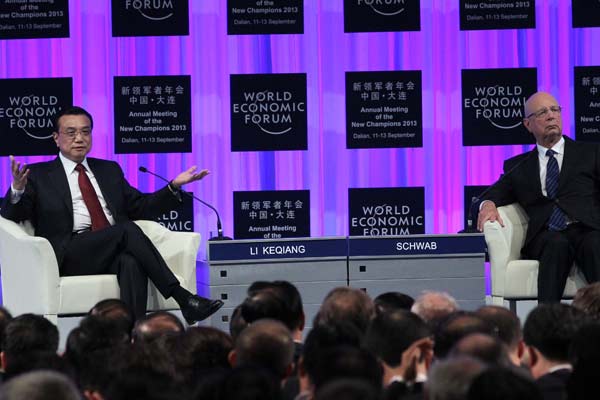Premier stresses transformation of the economy




Li confident of sustainable growth in the long run
China must push forward economic transformation and structural reform to achieve sustainable and healthy growth, Premier Li Keqiang said on Wednesday.
"Without structural transformation and upgrading, we will not be able to sustain economic growth in the long term," Li said.
 |
|
Premier Li Keqiang and Klaus Schwab, founder and executive chairman of the World Economic Forum, attend the opening ceremony of the forum's Annual Meeting of the New Champions 2013 in Dalian, Liaoning province. Li said China's economy has entered a phase of medium-to-high growth, striking an optimistic tone on continuing stable and sustainable development. [Zou Hong / China Daily ] |
His comments came in a keynote speech at the opening ceremony of the World Economic Forum Annual Meeting of the New Champions 2013, or "Summer Davos", in Dalian, Liaoning province.
China's economy has shown signs of stabilizing in recent months after a growth slowdown, signaled by larger-than-expected rebounds in trade, and surveys showing manufacturing regaining momentum.
The nation has shown a willingness to tolerate slower growth for reform initiatives.
A series of measures have been introduced in recent months to stabilize the economy, including small-scale investment in railways and public housing construction and policies to help smaller companies in need of financing.
"The economy is fundamentally stable, and the trend is positive," Li said.
As long as the major economic indexes are in a reasonable range, the macroeconomic policies will remain fundamentally stable, focusing on transformation of the economic growth model and adjustment of the economic structure, he said.
"Looking forward, China's development has a bright future. China has full capability and the conditions to maintain sustainable and healthy growth in the long term."
The government has set the full-year's GDP growth target at 7.5 percent with an inflation at less than 3.5 percent.
Li said that expanding domestic consumption, especially in services, will be the key part of the economic transformation, and balancing regional development and narrowing the gap between urban and rural areas will be a major task.
As part of efforts to push the transformation, China will foster new growth areas in domestic consumption, investing in sectors such as new energy, urban infrastructure and railways in central and western areas and promoting growth in services including health, culture and education, he said.















